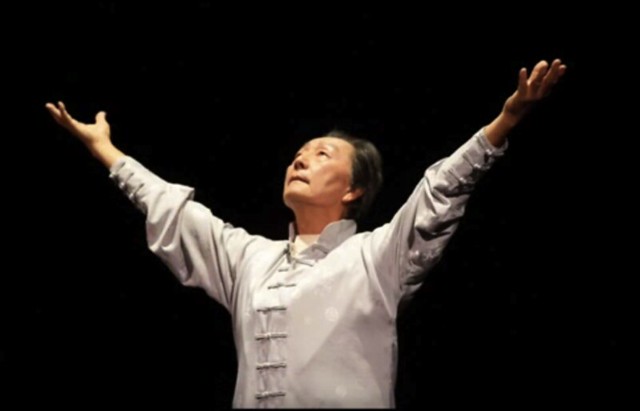
Throw our arms out to the unknown universe, and say simply, “I accept.”
[Image from the Living Tao Foundation; caption by Lily McCulloch.]
I have sat down to write Chungliang Huang, carried along by wu-wei: "to act without forcing — to move in accordance with the flow of nature's course which is signified by the word Tao, and is best understood from watching the dynamics of water… Sometimes true learning surprises you when it emerges. This is what we call wu-wei." (So it was described in his book Embrace Tiger, Return to Mountain: The Essence of Tai Chi, published 1973.)
My last letter was to Steve Andreas, the founder of Real People Press. Our conversation was brief and centered on the work of creating an unconscious change to life's problems, as they are called. Three-and-a-half years ago, I knew what was needed — to come back into my physical body, and I quote from my journal: "Get out of my head and be among people; exercise my limbs and muscles, my balance, strength, and response — perhaps through dance, yoga, or t'ai chi?" I sensed the start of a "cure", but I took no action. I'd never attempted any of those arts and felt unsure of how to begin.
So now I begin with this letter, October 16, 2016 —
Dear Chungliang,
I've spent part of the last three days listening to your teachings during my work-day commute. I watched videos which included interviews of you, your dance performances, and excerpts from The Tao of Bach. I watched you demonstrate Chinese calligraphy, explain Yin-Yang, tai-ji, and bring to life the concepts of centering and balance. Within this video The Tao of Bach: Project Images, I found the picture of you with outstretched arms which I attached to this letter.
- The still images are accompanied by Air on the G String, a violin arrangement — one might say a "remix" in today's language — which altered the second movement of Johann Sebastian Bach's Orchestral Suite No. 3, about 150 years after the original composition.
I also enjoyed this second video for a glimpse into your personal development as a Chinese-American artist:
In this talk you said: "I realized I needed to really follow what is in my heart. Dance was it. Performing was it… So, I found a little niche, I found a way I could make myself unique and honest — that's what helped me to become who I am."
You emphasized one word especially — honest — and that is how I long to live, more urgently than ever!
Certain teachings you imparted this week remain strong and vivid in my mind:
"Perfect balance" is never attained; the closest to perfect balance is death. Our practice is to go back and forth between off-balance and a return to our center. During an interview while you were demonstrating Tai Ji dance, you said that "losing balance" allows us to come back to center. Here is my interpretation: a mistake is actually counter-point or contrast — the raw material of a more complex harmony. It allows us to deviate from our fixed plan or choreographed steps, so the "mis-step" can revitalize our dance as we find the next step to follow it.
I've known that somewhere in my life, I want to dance; more basically I want and need to inhabit my body once again. Even now as I rearrange words on a digital screen, and my intellect seems so busy and "in charge", I sense how incomplete this letter is, if I do not dance and learn to express my body's powers.
During these last three days, I asked a friend of mine who practices Tai Ji (but has moved some distance away) for a referral of where I may take classes. He recommended someone in my neighboring city who received instruction at Naropa University in Boulder, Colorado. I sent this teacher an email, and am committing to follow through on this contact, or keep looking until the teacher is found. I will make a sincere attempt at learning and practicing Tai Ji. Then see what unfolds.
I plan to write my next letter to the cellist David Darling (#165), whose music I loved years before I heard the name Chungliang Huang. Then I learned that David was one of your collaborators in The Tao of Bach — so again, the path materializes before me.
For your awareness, I'm publishing this letter on my blog Conversings — also known as One Thousand Conversations. If you have the interest or time to write back, please let me know if I may publish your response on the blog. Do you object to any of the content I've assembled in this message — your image, the videos, or quoting your words? I will remove any or correct their presentation as you wish.
I welcome any comments or suggestions regarding my direction, and that of One Thousand Conversations, from you or your colleagues at the Living Tao Foundation.
Thank you for the gift of your insights and creative vision to the world.
Andy
No comments:
Post a Comment